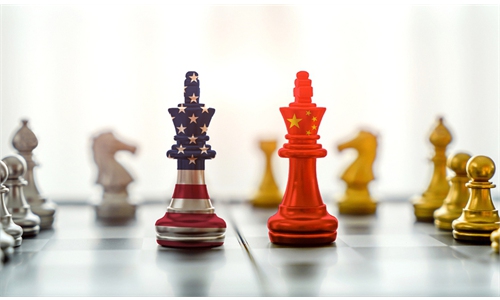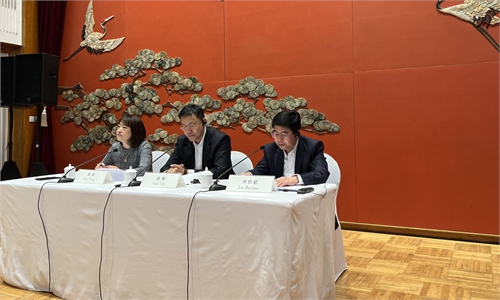
A concept photo of artificial intelligence (AI) Photo: VCG
The China-proposed Global Artificial Intelligence (AI) Governance Initiative has received positive responses from the international community, as it stresses fairness and justice as core to the global AI governing system and manifests multiple guidelines that are of wide global recognition, Chinese officials said. They also noted that since the initiative being launched in mid-October, many countries have shown eagerness to strengthen policy communication and pragmatic cooperation with China in the field of AI.
The comments were made at an AI governance-themed seminar held in Beijing last week. With regard to the development on starting China-US government talks on AI, Chinese officials also disclosed at the forum that China's Ministry of Industry and Information Technology (MIIT) will discuss AI exchanges and communication with the US side based on the result of China-US Summit in San Francisco, and such cooperation will bring ultimate benefits to the global technological innovation.
"The international society recognized that the China proposal embodies the concept of global community of shared future for mankind and shows China's responsibility to facilitate human progress. It meets the needs of individual countries in developing AI and has made unique contribution in promoting the orderly and safe development of AI," Gao Lin, an official at the Cyberspace Administration of China, said at the forum.
In October, China put forward the Global AI Governance Initiative, which covers three aspects of AI development, safety and governance. It offered a constructive way of thinking on AI issues that are of global concern and provide a reference for relevant global discussions and rule-making.
Positive response
Some developing countries have commended the initiative's emphasis on fairness and non-discrimination, according to Gao. "Those nations noted that the AI rules should not be decided by only a small number of developed countries and therefore it is necessary to enhance the right of speech of the Global South in AI field, and to boost building a fair, just global AI governing system," Gao said.
Chinese officials also stressed that the initiative underscores the country's openness in global AI cooperation, while constituting a strong objection to certain countries' technological monopoly and unilateral restriction practices that obstructs global AI development.
"The world has been discussing joint AI governance. But it is important to note that common development is the foundational step for AI governance cooperation. If barriers and mistrust already persist in the development process, how could we proceed to joint governance in the next step?" Liu Bochao, an MIIT official, said at the forum.
Therefore, "China's proposal is constructive and consequential not only for solving those issues that we currently have," he explained, adding that China is willing to share its new development on AI with the world to bridge gaps and ensure common development.
As part of the proof that mirrors China's active role fostering global AI cooperation, Chinese and US leaders have agreed in San Francisco to establish China-US government talks on AI.
"We sincerely hope that China, US can deepen communication in AI, such as supporting the cooperation between research institutes and enterprises from both countries. We also welcome US multinationals to co-build AI research institute with Chinese peers, to create global innovative platform, accelerate tech innovation and jointly promote the innovative and healthy development of AI," Liu said.
"Both China and the US are major countries in AI development, and it is necessary for both sides to strengthen communication and coordination to promote the development of AI to the benefit of all mankind," Liu said at the forum.
According to Liu, China has the world's largest consumer and industry application market in AI.
He told the Global Times that the fast-lane development of AI will create new economic growth areas, accelerate the expansion of digital industries and facilitate the intelligent upgrade of traditional industries such as education, medical and transportation in China. The country currently has over 4,000 AI enterprises and it is estimated that core AI industry scale could hit over 500 billion yuan ($70 billion), he said.
Coordinating development with regulation
China has been leading in coordinating AI development with a healthy dose of regulation, which officials said also mark another contribution of "Chinese wisdom and solution" to the global administration of AI.
In July, Chinese regulators unveiled management measures on AI-generated content (AIGC), which took effect in August, making the country one of the first in the world to make a regulation on the fast-developing industry.
Gao told the Global Times at the seminar that to date, over 30 AI big models developed by Chinese firms have completed the filing process with cyberspace regulators, with some already open to the public. There are another 10 more undergoing the filing process.
China's supervision is aimed at ensuring the better application of technology with "red lines" being clearly drawn out, rather than preventing the development of newly emerging technology, according to Gao. "It provides a much-needed reference and certainty to Chinese AI start-ups," he noted.
Gao disclosed that relevant authorities are also promoting the establishment of a Chinese linguistic database, carrying out works in collecting and processing Chinese language, and are planning to publicize such information.
With regard to follow-up regulation, Chinese authorities are also drafting several rules on the safety and labeling requirements of AIGC training big models, which covers "the-whole-process" regulation of AICG industry, Gao noted.




